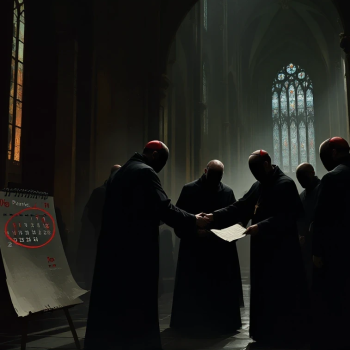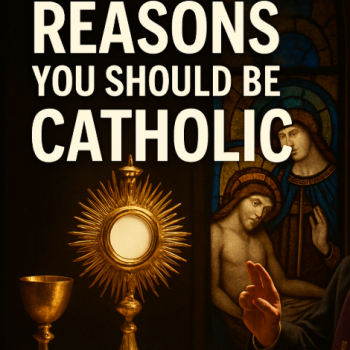In a recent article, A Synod of Disappointment Looms: Who Is This Synod for Anyway?, I asked the question: who is the Synod of Synodality (SoS) for anyway? I examined the document release as guidance for the First Session, Instrumentum Laboris (IL), for insight into the ultimate ends of the SoS. Not alone in my confusion, one need only scan websites like The National Catholic Register and The Catholic Thing to find numerous articles attempting to crack the code of the SoS. Clarification finally arrived in the publication of a new book (available for free) The Synodal Process is a Pandora’s Box by Jose Antonio Ureta and Julio Loredo de Izcue, with a forward by Raymond Cardinal Burke. Written in a question-and-answer format, the book contains multiple sources by which the authors lay out what they believe is the ultimate end for the SoS and the German Synodal Way (GSW) – compromise. The play? By offering up extreme changes to Church doctrine and practice, a middle way, or comprise is offered.
In this article, I explain this “play” and how those behind synodality seek to change Church doctrine, yet make it appear as if they are not. Faithful Catholics must make themselves aware and express their will as “the faithful” or potentially witness a seismic shift that may lead to an unrecognizable Catholic Church.
The Spirit of Synodality
In a general audience on August 23rd, Pope Francis spoke about the importance of the Synod of Synodality for the future of the Church. He stated that through the SoS, the Church opened its doors and took “into account everyone’s needs and suggestions.” And to contribute to a Church “where everyone feels at home, where no one is excluded.” Furthermore, he states that the Church must “learn a new way of living relationships, listening to one another to hear and follow the voice of the Spirit.” As one familiar with the synodal documents and the language used in them, this exhortation by Pope Francis does not provide encouragement to the faithful that the organizers behind the SoS will not take his words as preemptive approval of whatever compromises that will arise during the sessions in 2023 and 2024.
The Extremes
When one looks at the documents created by the GSW and the SoS, and the language used, the extreme positions of the organizers clearly reveal themselves. For example, in the document A Re-evaluation of Homosexuality in the Magisterium, we read:
Paragraphs 2357-2359 as well as 2396 (homosexuality and chastity), amongst others, of the Catechism of the Catholic Church should be revised as part of this re-evaluation of homosexuality. Similarly, the relevant passages in the Compendium of the Catechism (2005; No. 492) should be amended. “Homosexual acts” must be deleted from the Compendium’s list of “principal sins against chastity.”
Furthermore, it goes on to state that the Church must confess to the wrongdoing of calling homosexual sex sinful, cease to call it sinful, and remove all obstacles for homosexual persons to take up Church offices and the priesthood.
Moreover, the GSW has also approved a rite blessing same-sex couples in March of 2023 with 176 in favor, 14 against, and 12 abstentions (11 of these were bishops). Of the attending bishops, 38 voted in favor and 9 voted against the document. More recently, Archbishop Heiner Koch of Berlin, German, released a letter stating he will not discipline priests, deacon, and lay pastors who bless couples “who cannot or do not want to marry sacramentally.” To see the English translation, click here. This approach and the approach of the GSW contradicts the Vatican’s, Pope Francis approved, declaration from March 2021. In so doing, Archbishop Koch and the whole GSW undermined Church authority and, by extension, their own authority. Why should any Catholic, lay, priest, deacon, or religious, obey Archbishop Koch (and other German bishops) if they refuse to obey Rome?
Finally, both the GSW and the SoS have made it a point to allow for the reception of the Eucharist those remarried without an annulment, married priests, and both call for the ordination of women, either to the diaconate or priesthood.
The Architect
Now, the relator general for the SoS, Cardinal Jean-Claude Hollerich, shares the same views regarding human sexuality as does the GSW. In fact, Cardinal Hollerich is the archbishop of the German city of Luxembourg. In an interview with the German Catholic news agency KNA, Cardinal Hollerich made the following statement when asked how he gets around the Church’s teaching that homosexual sexual activity is sin:
I believe that this is false. But I also believe that here we are thinking further about the teaching. So, as the Pope has said in the past, this can lead to a change in teaching. So I believe that the sociological-scientific foundation of this teaching is no longer correct, what one formerly condemned was sodomy.
And
The Church has always moved with the times and has always adapted. But one always had much more time to do that. Today we must be faster. Otherwise, we lose contact and can no more be understood.
So, the cardinal thinks Church teaching is changeable and that the Church must move fast or lose contact and comprehension with the world. Fortunate for him that he has at his disposal the SoS, what Pope Francis calls “something truly important for the Church.”
The Play
In what Ureta and de Izcue’s book calls change “in the medium and long run,” those who seek reform present extreme changes to draw attention towards obviously unattainable goals. They then sit back and let the ensuing confusion filter throughout the Church, which is then fueled by threats of schism by both those who support the reforms and those that oppose them. Rome, in turn, seeking harmony and reconciliation, offers a compromise (in the medium). Those seeking reform accept the compromise knowing their targets remain in sight. They celebrate that the Church is now on the road towards the reforms they seek (long run). To them, the descent down the slippery slope has begun.
The Compromise
What sort of comprises do the authors speculate may occur? They posit that allowing for married priest may “quell the push for women’s priesthood” and allowing for blessing of same-sex couples “might dispense with a doctrinal approval of sodomy.” Or the play could be the democratization of the Church as the “true spirit” of synodality.
Once some radical claims are rejected, the issue of ‘democratically’ reforming the Church would remain—which is what the German bishops wanted from the beginning, as Bishop Bätzing (president of the German Bishops’ Conference and leading GSW promoter) acknowledges: “Francis also says in the interview that tensions must be healed, that we should include our issues in the Vatican World Synod currently underway. Well, this is our original content. This is exactly what we want.”
If the Church becomes more democratic, the door opens to more extreme changes.
Conspiracy Theory or a Cracked Code?
In conclusion, the evidence for a coming “compromise” seems clear. Authors Ureta and de Izcue did their homework. They provide links to multiple sources backing up their claims if anyone wants to “fact” check their work. Those behind both the SoS and the GSW have an agenda. With all the language of “inclusion” and “accompaniment,” there exists a not-so-hidden attempt to change Church doctrine. They will accept a “compromise” for now, as this only gets them at the top of the slippery slope.
In closing, I give the authors the final word. Please take a moment to read their insightful book.
Even if only some proposals of the [Synodal Way] or General Synod were approved—let alone carried to their ultimate consequences—changes in the Catholic Church would be such that one could legitimately ask whether she would still look like the Holy Roman Catholic and Apostolic Church founded by Our Lord Jesus Christ.
Thank you!
Read my other writing here.


















